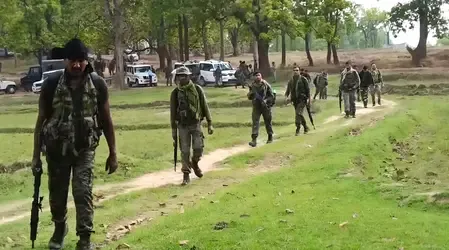What Led to the Surrender of Rewarded Female Maoist Sunita?

Synopsis
Key Takeaways
- Sunita surrendered to police, marking a significant victory.
- She was a rewarded female Maoist actively involved in recruiting and surveillance.
- Her role as an ACM highlights her influence within the Maoist structure.
- The surrender may inspire others to leave the Maoist movement.
- Police will provide her with support under rehabilitation policies.
Bhopal/Balaghat, Nov 2 (NationPress) In a major development for security forces engaged in the fight against Maoist insurgency, a female Maoist named Sunita, who was previously rewarded, has surrendered to police in Madhya Pradesh's Balaghat district, as reported by officials on Sunday.
This significant surrender occurred at the Chauriya Camp of the Pitkona police outpost under the Lanji police station, representing a notable victory in the ongoing anti-Maoist initiatives across various states.
Sunita surrendered on Saturday evening.
The 22-year-old is from the Veerman Indravati area of Bijapur district in Chhattisgarh.
She relinquished her arms, handing over an INSAS rifle along with three magazines to the police, as stated by Rakesh Kumar Pandro, the Balaghat Additional Superintendent of Police for Anti-Maoist operations, in an interview with IANS.
This surrender is perceived as a significant strategic setback for the Maoist organization due to her deep-rooted involvement and operational capacity within the group.
According to the senior official, Sunita had aligned herself with the Maoists in 2022.
She completed a rigorous six-month training in the Maad region, after which she was designated as a personal security guard to the infamous Central Committee member, Ramder.
Her connection to Ramder positioned her within the inner circle of the organization’s leadership, keeping her active in the Indravati and Maad regions before she moved to the Darreksa area of the Maoist Communist Centre zone with a team of eleven members.
Sunita held the rank of ACM (Area Committee Member), a role of substantial influence within the Maoist hierarchy.
In this capacity, she was responsible for recruiting new members from rural areas, distributing propaganda materials, and monitoring police activities.
Thus, her departure not only robs the Maoists of a skilled cadre but also disrupts their recruitment and surveillance efforts in the area.
Police believe that Sunita’s choice to surrender reflects a growing disillusionment among lower-rank Maoist members and the success of outreach and rehabilitation initiatives.
Her surrender is likely to inspire others to follow her lead, especially those who have felt coerced into the movement.
The Balaghat police have committed to providing Sunita with support under the state’s surrender and rehabilitation policy.
Her cooperation is also expected to bolster intelligence operations aimed at dismantling Maoist networks operating in the border areas of Madhya Pradesh and Chhattisgarh.
With this development, security forces have not only neutralized a vital operative but also conveyed a powerful message to the Maoist establishment regarding the tightening grip of law enforcement in Maoist-affected regions.









